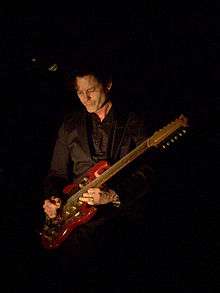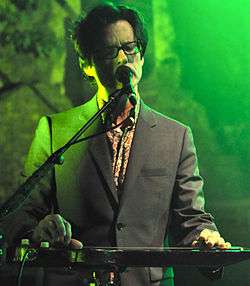Mark Hart
Mark Hart (born July 2, 1953), is an American musician and multi-instrumentalist best known for being a member of both Supertramp (1986–1988, 1996–2002, 2015-present) and Crowded House (1993–1996, 2007–2019). As well as being a group member, touring and session musician for acts such as Ringo Starr, Hart has composed film scores and is a record producer.
Mark Hart | |
|---|---|
 Mark Hart on guitar with Crowded House, Boston, August 2007 | |
| Background information | |
| Born | July 2, 1953 Fort Scott, Kansas, U.S. |
| Genres | Rock, pop, film score |
| Occupation(s) | Musician, composer, producer |
| Instruments | Vocals, guitar, keyboards, bass guitar, lap steel guitar |
| Years active | 1982–present |
| Labels | Capitol, A&M |
| Associated acts | Combonation, Supertramp, Crowded House |
| Website | markhartmusic |
Biography
Mark Hart was born on July 2, 1953 in Fort Scott, Kansas and grew up there. He has an older brother, Kelly, and an older sister, Millicent. From the age of seven years, Hart received piano lessons and followed by learning guitar some years later. Hart studied classical music at college, and then worked as a full-time session musician with varied artists. In 1982 he formed Combonation which issued its debut eponymous album in 1984 on Warner Bros. Records – it was produced by Ted Templeman (Van Halen).[1] Hart provided vocals, guitar and keyboards - other members were Steve Dudas on guitar, Randy Foote on percussion and backing vocals, Rick Moors on bass guitar and Billy Thomas on drums and backing vocals.[1]
Hart began his association with British rock band Supertramp in 1986, initially as a studio and touring musician. He provided guitar, keyboards, lead and backing vocals for their album, Free as a Bird, which was issued in October 1987.[2]
Hart also shared the same manager as pop-rockers Crowded House, who suggested he fill in for their keyboardist Eddie Rayner with session work for the band after they experienced difficulties working together. In 1991 Hart contributed to Woodface as a session musician, later joining the band as a touring member when Tim Finn left.[3][4] In 1993 Hart was credited as a full member for Together Alone.[3] He stayed with the band after founding drummer Paul Hester left,[3] and is seen along with the group's founders Neil Finn and Nick Seymour in the photographs from the sleeve for Recurring Dream, the 1996 greatest hits album. Hart played with the band during their farewell concert on the steps of the Sydney Opera House in November 1996, known as Farewell to the World.[3][4]
In 1993 Hart contributed to the debut album, Hang Out Your Poetry, by Ceremony (see Chaz Bono), providing electric guitar, harmonium, Mellotron, organ, Hammond organ, piano, backing vocals, Wurlitzer and co-composing tracks.[5] Also that year Tim Finn issued his solo album, Before & After, with Hart and former Combonation bandmate Dudas providing instrumentation, Hart also co-produced two tracks with Finn.[6]
Following the first demise of Crowded House, Hart stated that he thought the band had more in them. He later joined Neil Finn on stage for some of Finn's solo concerts supporting his debut solo album Try Whistling This in 1998. Following this, Hart rejoined Supertramp and produced more works for Tim Finn. In 2001 Hart released his debut solo album Nada Sonata - a second album The Backroom followed in 2014. Hart has scored the motion pictures Life Among the Cannibals (1996) and Mockingbird Don't Sing (2001) both directed by Harry Bromley Davenport.

In January 2007, Neil Finn announced the reformation of Crowded House with Hart, Nick Seymour, and a new drummer, Matt Sherrod (ex-Beck). They released a new album, Time on Earth, and embarked on a year-long world tour. The album was initially intended to be Finn's third solo album, but was converted to a Crowded House album late in the sessions. As a result, Hart contributed on only four songs to the new album. Both he and Sherrod fully contributed to the next album, Intriguer, which was released in June 2010 and both are on the DVD supplements to that album. After this the band went on indefinite hiatus although they played Sydney again in 2016.
Shortly after it was announced that Crowded House would perform at Byron Bay Bluesfest in 2020, Hart announced via his Twitter account that Neil Finn had chosen not to include him in the band anymore.
Mark was also a member of Ringo Starr’s backing band in the 2000s.
Solo Albums
Year Title Label 2002 Nada Sonata PSB Records 2014 The Backroom PSB Records
References
- General
- Bourke, Chris, Something So Strong, Macmillan Australia, 1997, ISBN 0-7329-0886-8
- Dix, John, Stranded in Paradise: New Zealand Rock and Roll, 1955 to the Modern Era, Penguin Books, 2005, ISBN 0-14-301953-8
- McFarlane, Ian (1999). "Whammo Homepage". Encyclopedia of Australian Rock and Pop. St Leonards, NSW: Allen & Unwin. ISBN 1-86508-072-1. Archived from the original on 5 April 2004. Retrieved 10 April 2012. Note: Archived [on-line] copy has limited functionality.
- Twomey, Chris & Doole, Kerry, Crowded House: Private Universe, Omnibus Pr, 1998, ISBN 0-7119-4816-X
- Specific
- "Combination – Combination: Credits". Allmusic. Rovi Corporation. Retrieved 13 October 2012.
- "Free as a Bird – Supertramp: Credits". Allmusic. Rovi Corporation. Retrieved 13 October 2012.
- McFarlane, 'Crowded House' entry at the Wayback Machine (archived April 6, 2004). Archived from the original on 6 April 2004. Retrieved 14 August 2012.
- Nimmervoll, Ed. "Crowded House". Howlspace – The Living History of Our Music (Ed Nimmervoll). White Room Electronic Publishing Pty Ltd. Archived from the original on 27 July 2012. Retrieved 23 January 2014.
- "Hang Out Your Poetry – Ceremony: Credits". Allmusic. Rovi Corporation. Retrieved 13 October 2012.
- "Before & After – Tim Finn: Credits". Allmusic. Rovi Corporation. Retrieved 13 October 2012.